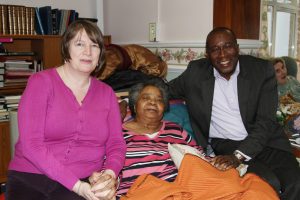
Ethnic minorities are better at ‘social care’, and we should learn from them, said Jackie Doyle-Price, the care minister at the Conservative Party Conference recently. (The Times, 4-10-17)She was echoed by Dr Phillip Lee, a GP who is also the justice minister. He told Age UK that British society has become ‘atomised’, and selfish, and ‘quite sick’.*
They both believe that families and neighbours should do more to help their elderly – and that ethnic communities are an example of how it should be done. Hot on the heels of their statements comes a report from Age UK that depression is a huge problem amongst the over 55s, because of a number of issues, including loneliness. The report said that ‘talking therapies’ helped a good deal. Well of course they would! Many people just need someone to talk to.
It’s true that ethnic communities seem to look after their elderly better than we do. (By ‘we’ I mean the collective rest of us.) Last Saturday I was at the Wesleyan Ladies UK retreat with around 60 or so ladies, including a handful who were in their 80s and 90s. It was a huge blessing to see not just the respect, but the depth of affection for the older ladies. It felt so right, so normal, so as it should be. There seems to be a warmth in ethnic communities for their seniors that we seem to have lost in the UK, even here in Wales.
So what’s gone wrong with the rest of us – and how can we put it right?
The care minister thinks that solving the social care crisis would require ‘a culture shift for every individual.’ And the justice minister, Dr Lee, says that, we all need to step up.
Sounds morally right, doesn’t it? But if you listen closely, rather than hearing a real concern for the elderly, you’ll detect the sound of the proverbial brush sweeping the nitty gritty under the carpet. Because being a good neighbour is not the same as providing social care. It’s more than keeping in touch and helping with shopping and building kind relationships.
Social care involves helping with the daily acts of living a frail older person can no longer do – like getting out of bed in the morning, showering, getting dressed and going to the toilet. It often calls for heavy lifting and hoists, something neighbours are not trained to do. And neither are family members.
Here’s something else worth mentioning. Ethnic communities generally have larger families, so the care can be shared by more people, instead of the solitary single carers who are often isolated and desperate for help. A report by Carers UK found that almost a third of long-term carers have not had a day off in five years.
The needs of older people in communities isn’t being overlooked by Christians. They are stepping up to the plate all over the country, and there are growing numbers of churches who are running befriending programmes, with very good effect. (An expert with excellent experience in this will be speaking at a conference we’re currently organising – watch this space!)
Perhaps being overlooked in this flurry is the fact that residential care homes are often the best place for a frail older person. I wrote earlier about the experience of a daughter whose mother developed dementia and who paid an agency to provide domiciliary care. The mother’s dementia worsened, spurred by experiencing 36 different carers over a six month period, some of whom cared so little about getting to know her that they didn’t even know if she preferred tea or coffee. Her daughter found her a place in a care home.
Finding a care home place is getting more and more difficult. ‘Which?’, the consumer group, has published research showing that over a quarter of people looking for a care home place will be unable to find one. Care homes are closing – and the main reason is lack of funding. It costs a lot to train staff and pay them a good wage. At Pilgrims’ Friend Society we appreciate our staff, and we value them more than Dr Lee seems to (see the Telegraph article.)
Jackie Doyle-Price says that older people should be prepared to sell their homes to pay for their care. She doesn’t think ‘it’s fair for the next generation of tax payers to pay for this generation’s long term needs.’ How odd that she doesn’t seem to realise that this generation paid for generations before them, all their working lives! When he took over the presidency of Public Health Institute a few years ago Professor John Ashton said that today’s older generation had been betrayed.














